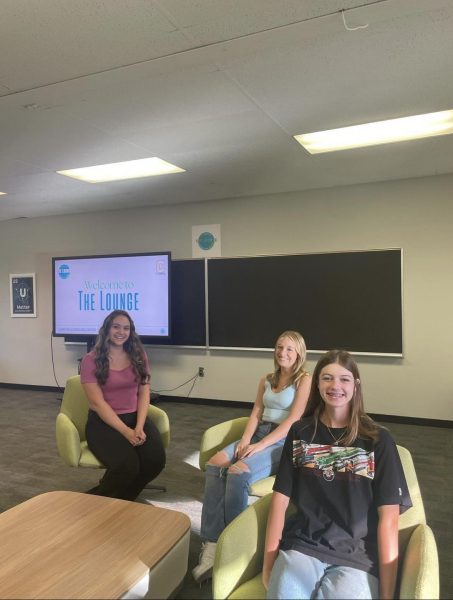Media Mania
December 15, 2021
Numerous things, both positive and negative, have sprung from social media, the biggest of which being the trends. A recent one on TikTok has teens glamorizing vandalism in schools. With an intriguing name of “Devious Licks”, it’s spread like wildfire throughout schools all over the United States. It was inevitable that the trend would catch on at Canyon, as the student body is diverse in personality and mind, and that day has passed.
Two soap dispensers were stolen from the boys’ bathroom and a urinal was damaged, leaving the school to replace the property with money that could’ve gone to something else. The students have received their punishments and restrictions have been put in place.
Canyon now requires students to go to the bathrooms with passes handed to them by teachers. Teachers can only release students one at a time, and camera footage is being monitored by security. The security guards have been keeping an eye out for any suspicious activity and known offenders. These restrictions pale in comparison to those implemented at other schools. Some schools have a range of measures, the most extreme of which require adults to accompany students to the bathrooms, which can only be occupied by one student at a time. Most bathrooms in these schools have been locked and students are only allowed to use one. Canyon’s policies are more appealing to students, whose compliance should keep policies from becoming stricter.
Students responded to these restrictions through the creation of a new trend: the “Angelic Yield”. “The Angelic Yield” was made to rectify the damage done by “Devious Licks”. Instead of breaking or stealing property, students brought their own as gifts to the school. Some have completely renovated their schools’ bathrooms, putting up decorations, couches, and mounting TVs. Others worked on a smaller scale, replacing missing classroom materials.
Faculty in schools have mixed feelings about this trend. Some appreciate the new supplies, but most would prefer that students stop intervening with the schools’ natural state, positive intentions in mind or not.
Mr. Abercrombie, Canyon’s principal, would prefer that such donations be made the proper way, through contact with the school.
As the “Devious Licks” demonstrate, social media has a strong grip on society. Teens rush to participate in trends no matter how damaging they may be to themselves or others, hoping for likes and comments. Validation from peers has always been big among teenagers, but social media has exacerbated that to a new level.
An infamous example of that is the Tide Pod Challenge, in which teens ate Tide Pods and it always went wrong. Though a small minority of teens had participated in that trend, the media attention it got blew the alleged number of participants out of the water, making the rest fall into the “teenagers are reckless” stereotype.
The way that teenagers are perceived contributes greatly to their trends. A lot of adults view teens as incapable of making good decisions, and with that only leaving other teens to seek opinions from, most teens care solely about how they appear to each other. If adults see them as irresponsible, why care what they think? Why adjust their character if it won’t be recognized?
That is how teens who participate in harmful trends rationalize their actions. They seek attention from their peers and they get it, even if it comes at the expense of their safety. Seeing the amount of attention their posts get increase makes them feel seen, and for that feeling, people will do almost anything.
Gone are the days where people worry about background checks when posting on the internet. Everyone has been warned by their parents about being careful with what they post, and with who they interact with on the internet. With social media becoming so widely used, it’s gotten harder for employers to get background checks, especially if their potential employees make use of private accounts. Having that security emboldens people, giving them the ability to post whatever they please.
There are advantages to having social media. People are able to find friends online and speak to them at any time. This virtual friendship provides them with the ability to be themselves without fear of judgement. If they can’t see each other, why should they fret over the way they look, or the way they sound? All the usual insecurities are gone.
Social platforms are also great for businesses, because they can see what kind of people are applying to work for them—provided that their accounts aren’t private. The posts people make can reflect who they are. If businesses see that their applicants make harmful posts, they can infer how those applicants might negatively impact their work and deny their applications. Being able to avoid people who could harm the business fosters more profits and greater productivity.
Social media is also beneficial to those seeking a safe space for their hobbies. Online communities can be found for virtually anything. With them, members can have others to talk to and enjoy their hobbies with. This is especially helpful to those who don’t have local groups to meet with or aren’t able to due to time constraints or physical limitations.
Police departments have extensive use for social media. Posts provide clues for the whereabouts of people who are being searched for, whether they’re victims or perpetrators, and that helps the police solve their cases. This year, the case of Gabby Petito blew up on TikTok and users took it upon themselves to aid in the solving of the case. They analyzed every post she made before her death, every detail known to the public, and all fingers were pointed at her fiancé, Brian Laundrie, who was found dead soon after Gabby was. The popularity of the case provided the police and FBI with support and pressure to get it solved. It is still unknown whether Laundrie is guilty of murdering Petito, but TikTok users are leaning towards him being at fault.
Arguably the biggest downside to social media is cyberbullying. People are bolder behind their screens, so they feel more comfortable hurtling insults and threats at others. A well-known victim is Amanda Todd, whose circumstances were shared with the world to raise awareness of cyberbullying. She committed suicide in 2012 as a result of the bullying she suffered from online, and she’s only one of tens of thousands of teens who did the same. With the development of social media over the years, cyberbullying has only increased, and is at an all-time high after online presence went up over quarantine. Though social media apps have guidelines in place to protect their users, those are easily disregarded through the rewording and censorship of words like “suicide” and “kill”. All that users can do is block accounts that harm them and hope that those accounts get banned.
Social media has its uses, but as with most things, it has downsides too. Ultimately, it’s up to the users to decide whether they’re willing to use social media and put themselves out there. No matter the decision, Canyon will persevere with any trend thrown its way.










